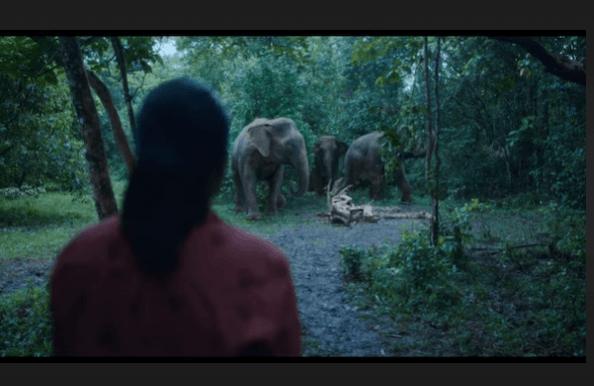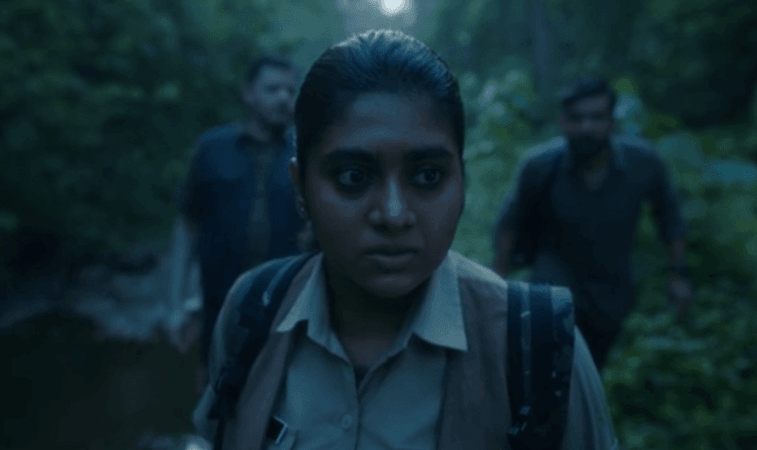
With sobering news of elephant fences demarking state boundaries, tigers on the 'prowl' for cattle, and leopards dropping in on gated communities, we might wash away any hopes that wildlife will last behind this century, or even 2050. There is no space on earth for anything that is not useful to man.
A recent study has calculated that humans make up 36 percent of land mammals while a whopping 60 percent comprises livestock and wildlife a mere 4 percent. Between need for land and resources for the burgeoning 8 billion humans, and greed, to own a coveted ivory tusk or tiger skin, wildlife stands no chance.
Exposing one of the problems facing wildlife is the highly acclaimed series 'Poacher' being streamed on Amazon Prime. Based on the country's largest ivory seized from poachers during the 2015-2017 Operation Shikar in Kerala, it points to the wildlife trade link to terrorist groups and drug mafia. The helplessness of the officers and the authorities in pursuing or arresting the influential buyers tells it all. Small players will come and go, leaving the place for others to follow. Strict vigilance alone can help.
The series, while slightly dramatized with midnight raids and intelligence gathering, stays faithful to the investigation that followed the poaching of over 18 tuskers (or more) in the many ranges of Vazhachal and Athirapalli forests of Kerala.
Storline
The protagonist, range officer Mala Jogi is inspired by DCF Manu Sathyan and some others, while Alan Joseph the techie from WTI is inspired by Jose Louise from wildlife crime control division of WTI. Similarly all other characters are based on their real life counterparts in the series which had the PCCF Surendra Kumar (retd) as consultant in tracing the story that begins with a confession that goes ignored.
Laughed at by the range officer and team as a 'drunk watcher making big claims', the man tries his luck at another forest station where more alert staff run a check that yielded elephant remains at the place he mentioned. Yet, despite phone numbers provided by the man, no inquiry was conducted. This was then leaked to media by an honest officer and it was the story by Malayalam Manorama journalist Jayan Menon that got the forces into action.
In the series directed by Emmy award winner Richie Mehta, this story of the largest haul of ivory since the early 90s is well captured in eight episodes. Finally, after the arrest of 73 people and recovery of huge haul of ivory worth Rs 25 crore, the 19 cases initiated by the KFD are still in court! Though the case was handed over to the CBI over inter-state and international involvement, there was nothing more uncovered.
Finally, the killing will stop only when the buying does. As long as there are humans that like to adorn their homes with tusks and ivory artefacts, there is little hope that the gentle pachyderm will not follow the trail of the woolly mammoth, caught between a gun and a shrinking home.
Power of Mafia
In the series, a dejected Mala, advised against pursuing the kingpins by her chief who warns about the power of the mafia, decides to pay heed. With Alan and his family, she goes into the jungle revisiting the spot where the elephant remains are now just a pile of bones. What she then sees will bring tears into the eyes of the most unemotional viewer. Shot in the forests of Kerala, the realistic shots of animals in the series is the product of computer graphics and visual effects.
'Poacher' shows what a handful of committed persons can do as opposed to the lazy apathy that rules a majority. It is the same question that will be voiced by many as posed by a friend of one hunter – why are you making a big thing out of the killings of a few elephants?? When educated by Mala and Babu on the role of elephants in regenerating forests, he retaliates and asks about the crops 'raided' by the elephants and the hungry mouths to feed at home!
To many people eking out a livelihood on the fringes of forests, the lure of some fast money can be tempting. The trumpetingof an elephant shot in the head bounces off.
The series suggests that buyers are not in faraway Japan and China alone, but also a few elite right here in India. Education alone can make a dent in public awareness on the cry of the gentle giant. Alan, the techie, is one of the rare specimen who brings up his young son to respect and appreciate life in all forms, be it frogs or snakes. Dialogues like his where he states that his work of protecting the ecosystem is as important to him as his family will resonate with anyone who loves nature.
Poorly staffed forest department
The problems are a lax patrolling aided by a poorly staffed and under equipped forest department where jugaad is the norm. Corruption is another given. Salaries for guards and watchers come months later. Any wonder then that some of these, as also officers in higher ranks, can get tempted by some easy money? All it needs is to turn a deaf ear literally.
Some of the graphics of a frog, fox, owl or mongoose inserted into the scenes add to render the scene thought provoking. Especially, a troop of monkeys on a tightrope walk across electric lines in a town was a statement in itself. Not to forget the last scene, watching which the viewer can relate to the aggressive statement of the protagonist when she declares she would like to 'shoot the killers in the head, pluck their teeth out and let them rot in the forests as scavengers do their work.'
Nimisha Sajayan lives the role of Mala, who loves the wilderness and is haunted by memory of her father, a poacher. Roshan Mathews as Alan, Dibyendu as Neel, their boss, are perfect in their roles of committed officers. The script and direction are tight and leave no scope for loopholes. Conversations are underscored with a sensitivity the topic requires.
Preventable
Finally, poaching is a challenge that can still be prevented by an alert forest department. Not so the loss of wildlife habitat. The series is not about that, though the sensitively crafted dialogues do bring in various issues like this. For those who watch wildlife news, 'rogue elephants' that are a 'menace' and 'straying tigers' are the result of a bigger problem -- burgeoning human population and its demand on land and resources. What is ironic is that protected areas in our country are less than 5 percent of the whole geographical area. Can't we leave even that?? Apparently not.
Economic development has taken a toll on our forests. Around 815,534 hectares of forest lands have been cleared in the last three decades alone to make way for thermal power, iron and steel, hydropower and mining projects, found a study by CSE.

We would like to run our roads through these forests to save an hour or two of our travel time. Who cares for a few road kills enroute! We eye the prized timber for our fancy homes and resorts. We love to build resorts on the edges of these forests so that we can go in droves in jeeps and gawk at the wildlife, which somehow get wise and give the slip. Our farmlands encroach ever so gradually on the forests and when the ragi or jackfruit tempts the pachyderm, we call him a rogue and set crowds and crackers on him!
Ensure habitat not broken
As Alan hints, in a reference to what WTI and other organisations do, the solution is in protecting the remaining habitats and ensuring the wildlife corridors are not broken. This is often done with the patronage of wealthy folks and conservationists who buy the land from the settlers and hand it to the forest department. Some corridors have been restored but much more is needed if we are to keep away 'the rogues' and 'cattle thieves'.
To many of us, the incidents shown in the series came as news, almost a decade after it all happened. This not only shows the poor priority given to forests and wildlife in the local and national media, but also is a clear indication of how conservation is sadly neglected in the country. 'Poacher' has brought to popular awareness a topic that is of immense importance to the well-being of all life on earth and hopefully will spark off more such offerings that will educate the people.


![Nayanthara and Dhanush ignore each other as they attend wedding amid feud over Nayanthara's Netflix documentary row [Watch] Nayanthara and Dhanush ignore each other as they attend wedding amid feud over Nayanthara's Netflix documentary row [Watch]](https://data1.ibtimes.co.in/en/full/806599/nayanthara-dhanush-ignore-each-other-they-attend-wedding-amid-feud-over-nayantharas-netflix.jpg?w=220&h=135&l=50&t=40)











![Nayanthara and Dhanush ignore each other as they attend wedding amid feud over Nayanthara's Netflix documentary row [Watch]](https://data1.ibtimes.co.in/en/full/806599/nayanthara-dhanush-ignore-each-other-they-attend-wedding-amid-feud-over-nayantharas-netflix.jpg?w=220&h=135)


